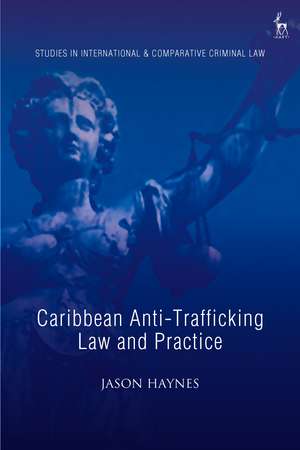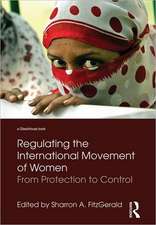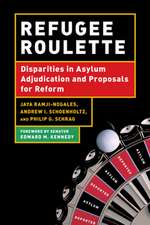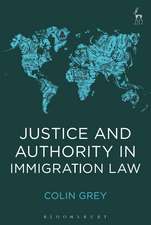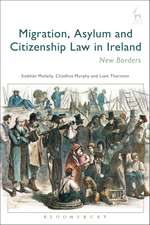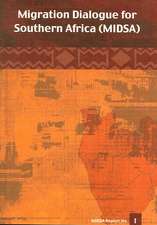Caribbean Anti-Trafficking Law and Practice: Studies in International and Comparative Criminal Law
Autor Dr Jason Haynesen Limba Engleză Paperback – 27 ian 2021
| Toate formatele și edițiile | Preț | Express |
|---|---|---|
| Paperback (1) | 358.30 lei 6-8 săpt. | |
| Bloomsbury Publishing – 27 ian 2021 | 358.30 lei 6-8 săpt. | |
| Hardback (1) | 779.02 lei 3-5 săpt. | |
| Bloomsbury Publishing – 10 iul 2019 | 779.02 lei 3-5 săpt. |
Din seria Studies in International and Comparative Criminal Law
- 30%
 Preț: 897.55 lei
Preț: 897.55 lei - 21%
 Preț: 275.26 lei
Preț: 275.26 lei - 30%
 Preț: 540.65 lei
Preț: 540.65 lei - 27%
 Preț: 345.42 lei
Preț: 345.42 lei - 28%
 Preț: 465.96 lei
Preț: 465.96 lei - 27%
 Preț: 442.83 lei
Preț: 442.83 lei - 27%
 Preț: 501.70 lei
Preț: 501.70 lei - 14%
 Preț: 603.73 lei
Preț: 603.73 lei - 14%
 Preț: 509.52 lei
Preț: 509.52 lei - 24%
 Preț: 374.34 lei
Preț: 374.34 lei - 11%
 Preț: 374.34 lei
Preț: 374.34 lei - 30%
 Preț: 779.33 lei
Preț: 779.33 lei - 30%
 Preț: 774.62 lei
Preț: 774.62 lei - 30%
 Preț: 893.89 lei
Preț: 893.89 lei - 24%
 Preț: 190.33 lei
Preț: 190.33 lei - 30%
 Preț: 570.02 lei
Preț: 570.02 lei - 18%
 Preț: 302.99 lei
Preț: 302.99 lei - 18%
 Preț: 297.86 lei
Preț: 297.86 lei - 18%
 Preț: 319.86 lei
Preț: 319.86 lei - 30%
 Preț: 603.81 lei
Preț: 603.81 lei - 30%
 Preț: 718.27 lei
Preț: 718.27 lei
Preț: 358.30 lei
Preț vechi: 435.80 lei
-18% Nou
Puncte Express: 537
Preț estimativ în valută:
68.56€ • 73.32$ • 57.16£
68.56€ • 73.32$ • 57.16£
Carte tipărită la comandă
Livrare economică 17 aprilie-01 mai
Preluare comenzi: 021 569.72.76
Specificații
ISBN-13: 9781509946242
ISBN-10: 1509946241
Pagini: 456
Dimensiuni: 156 x 234 mm
Greutate: 0.64 kg
Editura: Bloomsbury Publishing
Colecția Hart Publishing
Seria Studies in International and Comparative Criminal Law
Locul publicării:London, United Kingdom
ISBN-10: 1509946241
Pagini: 456
Dimensiuni: 156 x 234 mm
Greutate: 0.64 kg
Editura: Bloomsbury Publishing
Colecția Hart Publishing
Seria Studies in International and Comparative Criminal Law
Locul publicării:London, United Kingdom
Caracteristici
Of interest to practising lawyers in the area of human trafficking in the EU and the US due to the Caribbean's significance.
Notă biografică
Jason Haynes is Senior Legal Officer, British High Commission, Bridgetown, Barbados and former Lecturer in Law, University of the West Indies, Mona Campus, Jamaica.
Cuprins
1. Introduction I. Overview II. Locating the 'Commonwealth Caribbean' III. Situational Overview IV. Further Afield V. Summary VI. Structure of the Monograph2. Theoretical Perspectives on Human Trafficking Introduction I. Economic Theory II. Criminology Theories III. Feminist Theories IV. Brief Reflections V. Analytic Eclecticism VI. Methodology Conclusion 3. International Dimensions of Anti-Trafficking Law and Practice Introduction I. The Criminal Justice Approach II. The Human Rights Approach Conclusion 4. The European Approach to Human Trafficking Introduction I. Situational Overview II. Legal Frameworks III. Political and Institutional Commitment IV. Public Awareness, Stakeholder Collaboration and Capacity Building V. Criminalisation and Sanctioning VI. Investigation, Victim Identification and Referral VII. A Victim-Centred Approach VIII. Protection of Trafficked Victims IX. Material, Medical and Psychological Assistance and Accommodation X. Protection and Support for Child Victims XI. Regularisation of Immigration Status, Repatriation and Reintegration XII. Compensation XIII. Hegemonic Assumptions Conclusion 5. Anti-Trafficking Law and Practice in England and Wales Introduction I. Criminalising Trafficking in Persons II. Investigating Trafficking in Persons III. Identifying and Referring Victims of Trafficking IV. Discretionary Leave to Remain V. Support and Assistance of Trafficked Victims VI. Child Victims of Trafficking VII. Criminal Proceedings VIII. Compensating Victims of Trafficking for Harm Suffered IX. The Non-Punishment of Victims of Trafficking X. Institutional Commitment XI. Confiscation/Forfeiture of Assets XII. Prevention and Risk Orders XIII. Transparency in Supply Chains Conclusion 6. Normative Aspects of Caribbean Anti-Trafficking Law and Practice Introduction I. Domestic Legal Framework II. Normative Considerations Conclusion 7. Institutional Aspects of Caribbean Anti-Trafficking Law and Practice Introduction I. Human Trafficking on the National/Regional Agenda II. Capacity Building III. Stakeholder Collaboration IV. Victim Identification and Referral V. Court Proceedings Conclusion 8. Individual Aspects of Caribbean Anti-Trafficking Law and Practice Introduction I. Primacy of Victims' Rights II. Meeting the Basic Needs of Trafficked Victims III. Medical and Psychological Assistance IV. The Special Position of Child Victims V. Accommodation VI. Privacy and Confidentiality VII. Information, Documentation and Interpretation/Translation VIII. Regularisation of Victims' Immigration Status IX. Repatriation X. Reintegration Conclusion 9. Conclusion: The Way Forward Introduction I. General Findings II. Reforming Anti-Trafficking Law and Practice III. Summary
Recenzii
From the Foreword:Jason Haynes has approached this difficult topic with a balance of academic rigour and humanity. In addition to providing an invaluable source of information and data, he presents challenging arguments compelling everyone, especially politicians, lawyers, judges and academics to look again at the way in which we tackle these complex problems.
From the Foreword:This book is an essential and fundamental guide to any person or organisation that is interested or concerned about human trafficking... This book is stimulating and thought-provoking and empowers those who read it to revisit the laws, practices and protocols within their countries, and to employ their best efforts to ensure that firstly human trafficking is eradicated; secondly, that victims of human trafficking, in particular, children are protected; thirdly, that adequate safeguards are put in place; and, just as importantly, there is continued informative discussion and debate about the issue.
From the Foreword:This book is an essential and fundamental guide to any person or organisation that is interested or concerned about human trafficking... This book is stimulating and thought-provoking and empowers those who read it to revisit the laws, practices and protocols within their countries, and to employ their best efforts to ensure that firstly human trafficking is eradicated; secondly, that victims of human trafficking, in particular, children are protected; thirdly, that adequate safeguards are put in place; and, just as importantly, there is continued informative discussion and debate about the issue.
